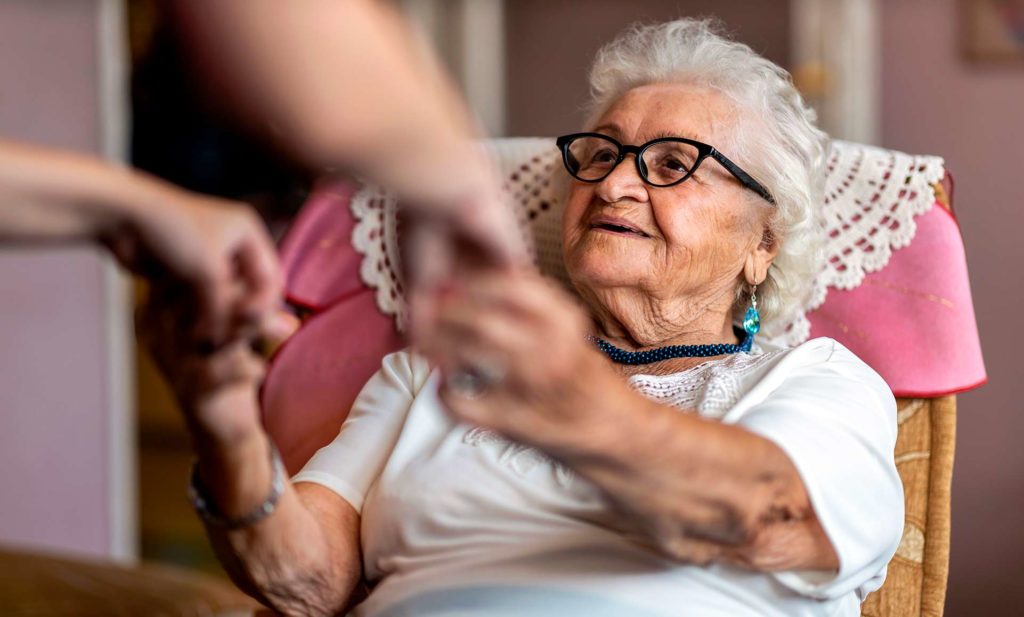Domiciliary Care Meaning
Domiciliary care is any form of care and support provided in your own home. You may have heard other terms used for domiciliary care such as homecare, care at home, in-home care, or home help.
Whichever term you use, the aim of domiciliary care is to give you the help you need in order to continue living independently in the comfort and familiarity of your own home. This environment promotes emotional well-being and a sense of security, both of which are essential to your quality of life.
What Does a Domiciliary Care Worker do?
If you love your home, why move out?
Domiciliary carers come to your home and provide a wide range of one-to-one, private care services specific to your needs and preferences; from administering medication, preparing meals, personal care, companionship, and more. A domiciliary carer is there to provide the help and support you need to maintain your desired level of health, wellbeing, and safety.
Is Domiciliary Care Only for Elderly?
Domiciliary care is for anybody who wants care in their own home rather than a residential care home or care institution.
The majority of clients who use our live in or hourly domiciliary care services do tend to be older. This is simply due to general health decline as you age and tasks once easily completed alone, start to require a little bit of help.
However, some of our clients are relatively young, they may have had an accident, have a physical or learning disability or may be fighting against a severe illness such as cancer, muscular dystrophy, or MS.
At Christies Care, we offer flexible and personalised domiciliary care no matter your age or care needs.
When Should You Consider Help and Support from Professional Carers or a Care Agency?
Deciding that you need to arrange care is not always an easy decision. It may feel like the loss of your independence and the life as you knew it. While life will change, this change is for the better. Our clients often tell us how they wish they had had a carer sooner. “If only I had known that it would make my life so much better” is a remark we often hear in our client feedback calls.
When a loved one needs help or support, it is often friends and family who first step in and help in any way they can. However, there comes a time when friends or family carers need a break or they simply are not able to meet the person’s increasing care needs. It is important to recognise the signs that a professional carer is needed before reaching a breaking point.
Signs it’s time to consider a home care:
· More frequent falls. You may start noticing increased bruising and scrapes.
· Dementia symptoms worsen. You may find they are more forgetful and finding it harder to perform basic tasks such as getting dressed or eating.
· Weight loss. There are a range of health conditions that could cause weight loss, including dementia where they forget to eat or have forgotten how to perpare certain meals.
· Depression and loneliness. Take the time to see if they are quieter than normal or seem particularly low.
· Neglecting personal care. You may notice changes in appearance, body odour, or the cleanliness of their clothes.
· Their house is unclean and untidy. While each of our standards are different, you may notice the house or their room becoming increasingly unclean. Spills that haven’t been cleaned up are also a common sign of dementia as the person is unable to recognise the follow-through to tidy.
· Increased Confusion. While this can be a sign of dementia, it can also be a sign of overall cognitive decline common in old age. You may notice they are struggling to make decisions, follow directions, and need lots of prompts and reminders.
· Struggling with finances. You may notice unpaid bills, overdrawn bank accounts or becoming more susceptible to scams.
How Can Christies Care Help Me?
Christies Care offers a range of domiciliary care services depending on the type and how much care you want or need. All of our home care services are personalised to your individual needs and preferences.
Live in Care
Live in Care is when a carer lives with you full time. This provides the care you want when you want it, and the flexibility to vary your routine. Live-in care itself falls into two types: introduced and managed.
· Introduced is for when you need a carer full-time but for more basic needs such as; companionship, cooking and safety while living independently. This care is not regulated, the carers are self-employed and Christies Care acts as an introduction care agency.
· Fully managed is for when you want Christies Care to take full responsibility for the care, or when the care needed is extensive and the carer must be managed. (for example, administering medication, helping with hoisting or complex moving and handling, personal care etc). This care service is regulated by the CQC and the carers’ performance is managed by Christies Care.
Visiting Home Care Services

Visiting home care, sometimes known as hourly or hour care is when you either do not need full time care, or you do need full time care, but don’t want a carer to live with you.
Depending on your care needs, you may only need a carer for one or two hours a week, or on a full time basis where a carer will come to your home for eight or maybe twelve-hour shifts.
Our highly skilled and compassionate carers are dedicated to making your life better. Our Princess Royal Award-winning training and 24 hour support offered to our carers means you can have confidence your loved ones are being cared for by the very best.
Fully Regulated by the CQC
A regulated care service is fully monitored and assessed by independent regulatory bodies. Regulation guarantees that your care, and the carer providing it, meets industry standards.
Christies Care Live-in Care (managed) and both part time and full time Hourly Care Services are regulated by the CQC (Care Quality Commission). This means that we train and assess our carers to CQC standards and all Christies Cares’ processes and care plans are inspected and rated by the CQC.
Christies Care has received the highest CQC rating of “Outstanding” for our last two care inspections, a prestigious rating only awarded to 5% of all care providers in the UK.
Examples of Domiciliary Care Services
Domiciliary Care Services include any tasks that maintain your independence and freedom in your own home.
Here are some of the daily tasks that our domiciliary carers can assist you with:
- Assisting in walking around the house, garden, or neighbourhood due to old age or mobility impairment.
- Assisting in getting in or out of bed, supporting dressing, and personal hygiene.
- Helping with household tasks such as washing clothes, dishes, cooking, and shopping etc.
- Assisting with taking their medication and keeping to prescriptions.
- Providing support in maintaining prescribed diets.
- Driving to and from medical appointments as well as leisure activities such as seeing family and friends, going to events, or just getting out the house for a cup of coffee at a café.
How Much Does Domiciliary Care Cost?
Deciding professional homecare is needed is one of the biggest decisions of the rest of your life. While selling your home to move into residential care is usually irreversible, one of the great advantages of domiciliary care is that you can try it out in small doses. You can try live in or hourly homecare for a few weeks to see what it’s like before committing.
Our domiciliary care services are priced depending on how much care you want or need.
Hourly visiting care (CQC regulated, Outstanding) £ 30 per hour weekdays, £33 per hour weekends and bank holidays
Introduced live-in care (not regulated but with carefully selected and trained carers) Between £1,100 and £1,390 per week, depending on the work needed. We can give you an exact quote over the phone.
Fully managed live-in care, CQC Regulated and Outstanding Between £1,569 and £2,079 per week, depending on the work needed. We can give you an exact quote over the phone.
24 hour, hourly visiting care (CQC regulated, Outstanding)At £30 an hour, 24 hours a day, seven days a week; £5040 a week. Having two live-in carers at £1,600 a week each adds up to a good deal cheaper.
Who Pays For Domiciliary Care?
Care funded by local authorities
Your local authority might be able to pay some or all the costs associated with domiciliary care. Make sure you claim all the benefits you’re entitled to – Attendance Allowance and Disability Living Allowance (or Personal Independence Payment) are among the most common.
For local authority to fund your care, the care provided needs to be fully regulated care.
Care funded privately
You may need to fun your care yourself, there are a few ways to privately fund care such as; equity release, savings, or funded by family.
If you are funding your own care, the care you receive does not need to be fully regulated care.
For more detailed information about the cost of home care, what is included in these costs, and funding options – read our blog post:
What is the Difference Between Domiciliary Care and Residential Care Home Services?
Domiciliary care services are provided in your own home, whereas residential care home services involves you moving permanently into a specialist supervised establishment set up solely to provide care.
By receiving care in your own home, you maintain control over your daily routines, activities, decision-making processes, and you remain close to family, friends, and your community. Not only do you maintain your familiar bonds, but by receiving one-to-one care, you develop meaningful relationships with carers, offering companionship, empathy, and a sense of belonging. This plays a vital role in promoting emotional well-being and overall happiness.
By moving into a care home, you are surrounded by a team of carers dedicated to your health and wellbeing, as well as other members of the community who may require the same care as you. While this may not be your old community from where you once lived, many residential care establishments offer a range of group activities and events to promote healthy social interactions.
Deciding which is best for you is about your individual preferences and what is going to make your life better and easier for you.
Conclusion:
Domiciliary Care is a very important type of care which allows you to stay at home and function as an independent individual. The environment in which you receive care impacts greatly on your physical, emotional wellbeing and social wellbeing.
If you think staying independently in your home is the best care option for you, contact our expert team and speak to us about your care needs – we are here to help you.





